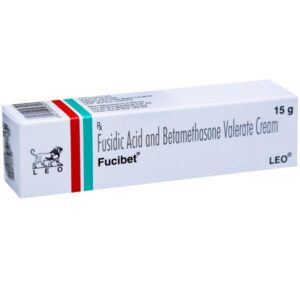FUSIDIC ACID + BECLOMETHASONE
Fusidic Acid: Fusidic acid is an antibiotic drug that belongs to the class of drugs known as fusidanes. It is primarily used to treat bacterial infections caused by Staphylococcus aureus and certain other susceptible bacteria. Fusidic acid is commonly used topically to treat skin infections, such as impetigo, infected eczema, and infected wounds. It can also be given orally to treat systemic infections in some cases.
The mechanism of action of fusidic acid involves inhibiting bacterial protein synthesis. It specifically targets the elongation factor G (EF-G), which is necessary for the translocation step of protein synthesis. By binding to EF-G, fusidic acid prevents the translation of mRNA into proteins, leading to bacterial cell death.
The dose of fusidic acid depends on the type and severity of the infection. For topical use, a thin layer of ointment or cream is usually applied to the affected area two to three times a day. The duration of treatment can vary from a few days to several weeks, depending on the specific infection being treated. When used orally, the dose and duration of treatment will be determined by the healthcare provider based on the severity of the infection and the patient’s condition.
Like any medication, fusidic acid can have side effects. Common side effects of topical use include skin irritation, redness, itching, and rash at the application site. Systemic use of fusidic acid can sometimes result in gastrointestinal disturbances, such as nausea and diarrhea. In rare cases, it may cause liver dysfunction. Allergic reactions, although rare, can occur and may manifest as skin rash, itching, swelling, or difficulty breathing. It is important to consult a healthcare professional if any concerning side effects occur while using fusidic acid.
Beclomethasone: Beclomethasone is a corticosteroid medication used to treat asthma and allergic rhinitis (hay fever). It is available in various formulations, including an inhaler for asthma and a nasal spray for allergic rhinitis.
The mechanism of action of beclomethasone involves its anti-inflammatory properties. It works by reducing inflammation in the airways and nasal passages, which helps to relieve symptoms such as wheezing, breathlessness, nasal congestion, and sneezing.
For asthma treatment, beclomethasone is typically taken as an inhalation therapy. The recommended dose may vary depending on the severity of the condition and age of the patient. Generally, the starting dose is 100-200 micrograms twice daily, which may be adjusted based on the individual’s response. It should be used regularly, even when symptoms are well-controlled, to maintain asthma control.
For allergic rhinitis, beclomethasone is administered as a nasal spray. The usual recommended dose for adults and children over 12 years old is 1-2 sprays in each nostril once daily. The dose for children under 12 years old is usually lower and should be determined by a healthcare professional.
Like any medication, beclomethasone can have side effects. Common side effects include a sore throat, cough, hoarseness of voice, throat irritation, and nasal irritation or dryness when used as a nasal spray. These side effects are usually mild and temporary. However, if they persist or worsen, it is advisable to consult a healthcare professional.
In rare cases, the use of beclomethasone can lead to more serious side effects, such as adrenal suppression, growth retardation in children, cataracts, glaucoma, and osteoporosis. These risks are generally associated with long-term and high-dose use of corticosteroids. It is important to use the lowest effective dose for the shortest duration of time to minimize the risk of these side effects.
As with any medication, it is essential to follow the prescribed dosage and consult a healthcare professional if any concerns or side effects arise.

